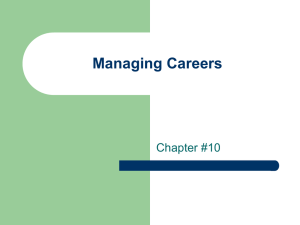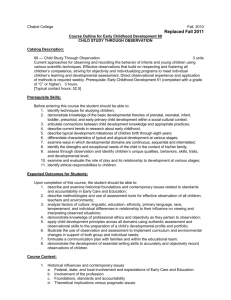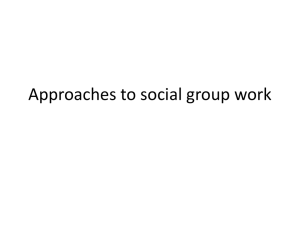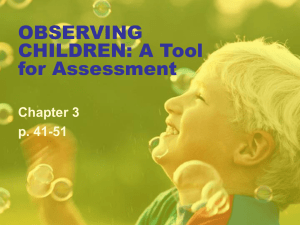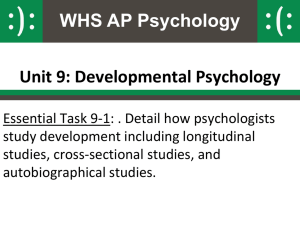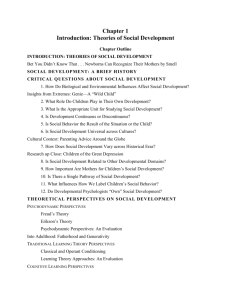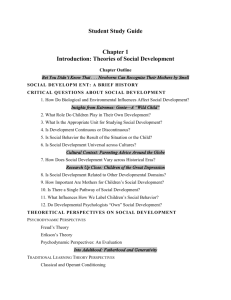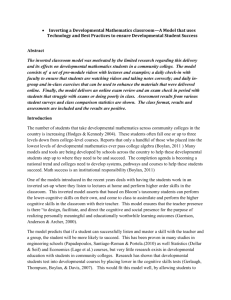CHILD DEVLEOPMENT II (12-19-13) Course Code: 096826
advertisement
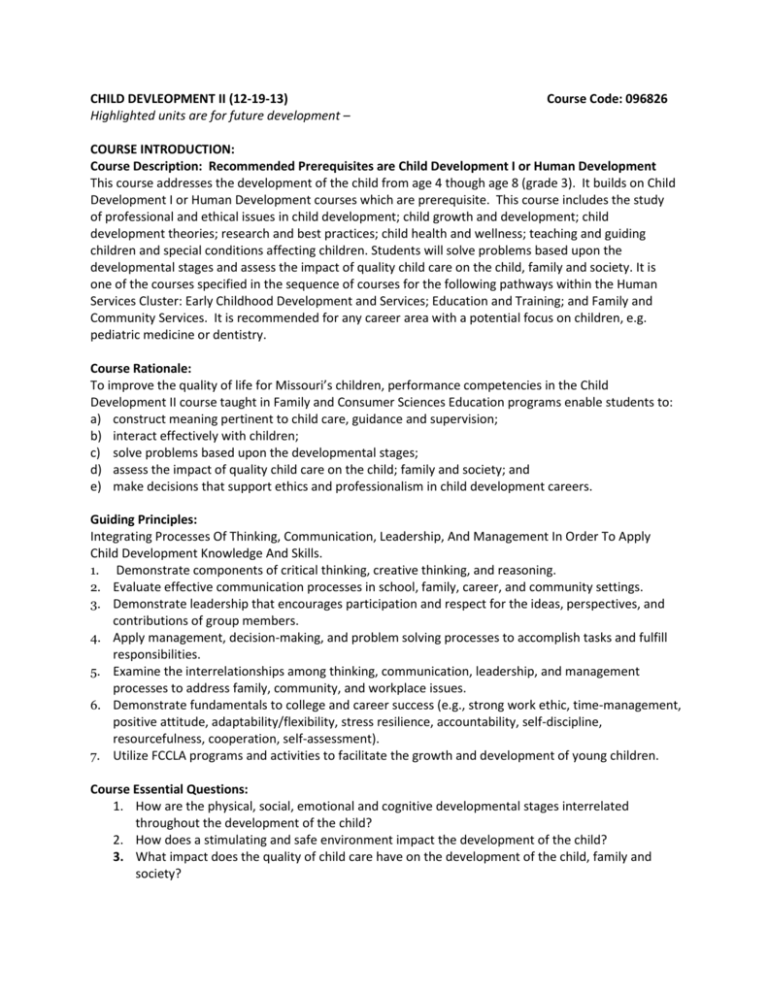
CHILD DEVLEOPMENT II (12-19-13) Highlighted units are for future development – Course Code: 096826 COURSE INTRODUCTION: Course Description: Recommended Prerequisites are Child Development I or Human Development This course addresses the development of the child from age 4 though age 8 (grade 3). It builds on Child Development I or Human Development courses which are prerequisite. This course includes the study of professional and ethical issues in child development; child growth and development; child development theories; research and best practices; child health and wellness; teaching and guiding children and special conditions affecting children. Students will solve problems based upon the developmental stages and assess the impact of quality child care on the child, family and society. It is one of the courses specified in the sequence of courses for the following pathways within the Human Services Cluster: Early Childhood Development and Services; Education and Training; and Family and Community Services. It is recommended for any career area with a potential focus on children, e.g. pediatric medicine or dentistry. Course Rationale: To improve the quality of life for Missouri’s children, performance competencies in the Child Development II course taught in Family and Consumer Sciences Education programs enable students to: a) construct meaning pertinent to child care, guidance and supervision; b) interact effectively with children; c) solve problems based upon the developmental stages; d) assess the impact of quality child care on the child; family and society; and e) make decisions that support ethics and professionalism in child development careers. Guiding Principles: Integrating Processes Of Thinking, Communication, Leadership, And Management In Order To Apply Child Development Knowledge And Skills. 1. Demonstrate components of critical thinking, creative thinking, and reasoning. 2. Evaluate effective communication processes in school, family, career, and community settings. 3. Demonstrate leadership that encourages participation and respect for the ideas, perspectives, and contributions of group members. 4. Apply management, decision-making, and problem solving processes to accomplish tasks and fulfill responsibilities. 5. Examine the interrelationships among thinking, communication, leadership, and management processes to address family, community, and workplace issues. 6. Demonstrate fundamentals to college and career success (e.g., strong work ethic, time-management, positive attitude, adaptability/flexibility, stress resilience, accountability, self-discipline, resourcefulness, cooperation, self-assessment). 7. Utilize FCCLA programs and activities to facilitate the growth and development of young children. Course Essential Questions: 1. How are the physical, social, emotional and cognitive developmental stages interrelated throughout the development of the child? 2. How does a stimulating and safe environment impact the development of the child? 3. What impact does the quality of child care have on the development of the child, family and society? UNIT 1 – AREAS OF DEVELOPMENT UNIT DESCRIPTION: Understanding the relationships among Developmental Stages and how to encourage healthy growth (Physical, Social, Emotional, and Cognitive). ESSENTIAL QUESTIONS: 1. How have different theories for child development influenced the education of young children? 2. What are the relationships between developmental stages (physical, social, emotional, cognitive)? ESSENTIAL MEASURABLE LEARNING OBJECTIVES 1. Identify child development theories and how they impact our interactions with children (e.g., Erikson, Freud, Maslow, Montessori, Piaget, Skinner, Elkind). 2. Identify brain development research associated with the development of children. 3. Investigate the physical developmental stages of children. 4. Research the social developmental stages of children. 5. Research the emotional developmental stages of children. 6. Investigate the cognitive developmental stages of children. UNIT 2 - CREATING STIMULATING ENVIRONMENTS FOR CHILDREN UNIT DESCRIPTION: Students will learn how to create a stimulating environment along with developmentally appropriate activities to meet the developmental needs of children. ESSENTIAL QUESTIONS: 1. How can a stimulating age-appropriate environment be created? 2. How can the environment be accommodated for all learners? ESSENTIAL MEASURABLE LEARNING OBJECTIVES 1. Describe how play can be used in creating a stimulating environment for children. 2. Evaluate age and developmentally appropriate activities. 3. Select appropriate activities for children of varying developmental needs, individual differences, and culture. 4. Design a lesson plan incorporating learning activities according to a theme. UNIT 3 - OBSERVING CHILDREN ESSENTIAL QUESTIONS: 1. Why observe children at different stages of development? ESSENTIAL MEASURABLE LEARNING OBJECTIVES 1. Identify reasons for observing young children (e.g., child interactions, child strengths and weaknesses, curriculum planning, child behaviors within a class and communicating with parents). 2. 3. 4. Explain methods for observing and documenting the behavior of young children (e.g., objective, subjective, checklist, anecdotal). Apply knowledge of developmental stages to observation and/or interaction with individual children. Use appropriate techniques for observing and documenting behavior. UNIT 4 - IDENTIFYING QUALITY CHILD CARE PROGRAMS ESSENTIAL QUESTIONS: 1. What does a quality child care program look like? ESSENTIAL MEASURABLE LEARNING OBJECTIVES 1. Identify components of and barriers to quality child care programs. 2. Identify criteria for selecting a child care program models (e.g., quality, affordability, access, curriculum). UNIT 5 –EXPLORING THE IMPACT OF CHILD CARE MODELS UNIT DESCRIPTION: Explores different child care program models and how they impact children. ESSENTIAL QUESTIONS: 1. How do different child care models affect a child? ESSENTIAL MEASURBLE LEARNING OBJECTIVES 1. Explain the impact of including education as a part of a quality child care program. 2. Identify how different child care program models affect a child’s development. UNIT 6 - ASSUMING LEADERSHIP ROLES AS RESPONSIBLE FAMILY MEMBERS AND CITIZENS ESSENTIAL QUESTIONS: 1. What leadership qualities and skills are necessary for an individual to become a responsible leader in their family and community? ESSENTIAL MEASURABLE LEARNING OBJECTIVES 1. Utilize leadership qualities and skills for solving problems related to the care and development of children (i.e., FCCLA programs and activities such as Focus on Children, Early Childhood, and Digital Stories for Change). 2. Develop skills to affect public policy related to child development, care and guidance.



